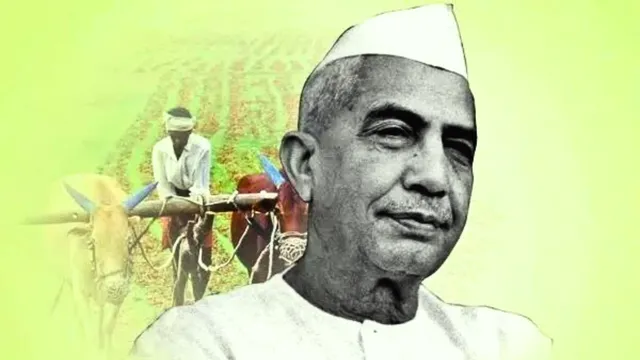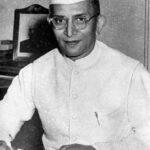Charan Singh: An Unyielding Advocate for Rural India’s Progress
Chaudhary Charan Singh, the 5th Prime Minister of India, is remembered as a champion of India’s rural population and a strong advocate for agrarian reform. Born on December 23, 1902, in a small village in Uttar Pradesh, Charan Singh’s rise in Indian politics was a result of his deep-rooted connection with rural life and his unwavering commitment to improving the conditions of farmers. His life journey and his impact on India are remembered even today, long after his tenure as Prime Minister.
Early Life and Education
Charan Singh was born into a Jat family in the village of Noorpur, Uttar Pradesh. His family was primarily engaged in farming, and this early exposure to agriculture shaped his entire career. He studied at the village school and later at Aligarh Muslim University, where he earned his Bachelor’s degree in Arts. Although he initially pursued his education with a focus on becoming a civil servant, Singh’s early experiences in the rural areas led him toward social activism and politics.
Singh was always deeply aware of the issues affecting farmers, and from a young age, he had a strong desire to improve their living conditions. His exposure to rural life was the foundation of his future political ideology, which centered around agrarian reform and the upliftment of the farming community.
Political Career and Rise to Prominence
Charan Singh’s political career began in the 1930s when he joined the Indian National Congress (INC) and became involved in the freedom struggle. However, after India gained independence in 1947, he began to realize that the country’s politics were dominated by urban interests, and the rural population’s needs were largely neglected. This realization drove him to leave Congress and form his own political identity.
- Leadership of the Farmer’s Movement: Charan Singh’s most notable contribution was his unwavering dedication to the welfare of farmers. He was instrumental in organizing farmers’ movements and protests, advocating for policies that would benefit rural India. He led the All India Kisan Sabha (AIKS) and was at the forefront of the struggle for better prices for agricultural produce, land reforms, and financial support for farmers.
- Rural Development Focus: Singh’s focus on rural development was not limited to protests. He worked to implement laws and schemes that would directly benefit farmers. As the Minister of Agriculture and later as the Prime Minister of India, his policies aimed at enhancing agricultural productivity, ensuring fair prices for farm produce, and promoting rural self-sufficiency.
As the 5th Prime Minister of India
Charan Singh served as India’s Prime Minister from July 28, 1979, to January 14, 1980. His tenure was relatively short, lasting only about seven months. However, his political decisions and leadership style had a long-lasting impact, especially on rural development and agrarian policies.
- Focus on Farmers’ Rights: Charan Singh’s tenure as Prime Minister was marked by a commitment to rural India. He sought to strengthen the agricultural sector and ensure that farmers received fair treatment from the government. He also worked to bring attention to the issues of landless laborers and small-scale farmers.
- Formation of the Janata Party: Before becoming Prime Minister, Charan Singh was a key leader in the Janata Party, which was formed in 1977 in the aftermath of the Emergency declared by Indira Gandhi. His leadership in the Janata Party helped unite opposition forces, and the party played an essential role in replacing the Congress party in power. Charan Singh’s role in the Janata Party exemplified his political savvy and deep commitment to the democratic process.
Charan Singh’s Legacy and Impact
Charan Singh’s political ideology was primarily focused on the development of rural India. He believed that India’s progress could only be realized if the rural population was uplifted. His legacy is still reflected in the political discourse around agrarian reforms and the welfare of farmers.
- Agrarian Reforms: Charan Singh’s advocacy for agrarian reforms led to policies aimed at distributing land more equitably among the rural population. He was a strong proponent of land-to-the-tiller policies, which sought to transfer land from large landowners to the tenants who actually worked the land.
- Champion of the Farmers: Even though his time as Prime Minister was short, Charan Singh’s dedication to the farmers of India is remembered as one of his most significant contributions. His policies, though not fully implemented, set the stage for later reforms in India’s agricultural sector.
- Political Leadership: Charan Singh’s leadership was also marked by his ability to form coalitions and unite various political factions. He was an astute leader who understood the complexities of Indian politics and was able to build a political platform based on his deep knowledge of rural India.
Daily Life and Personal Philosophy
Charan Singh was known for his simple, disciplined lifestyle. He lived modestly and was always approachable to the common people. His personal life mirrored the values he upheld in his political career: simplicity, honesty, and a deep commitment to the people of India.
- Simple Lifestyle: Singh was known for his austere lifestyle, which was in line with his belief in frugality and self-reliance. His personal philosophy was deeply influenced by his rural roots, and he always tried to lead by example, living a life that reflected the values he sought to instill in his policies.
- Health and Diet: Charan Singh also maintained a healthy lifestyle, often adhering to a vegetarian diet. His daily routine involved physical activity, including walks and exercises, which he believed helped maintain both physical and mental well-being.
- Spiritual and Ideological Beliefs: He was a deeply spiritual man, drawing strength from his faith in Hinduism. Singh’s political ideology was based on the principles of self-reliance and decentralization, believing that local communities should have more control over their resources and governance.
FAQs About Charan Singh
Q1: Why was Charan Singh important in Indian politics?
Charan Singh was significant for his tireless work advocating for farmers and rural communities. His focus on agrarian reforms and his leadership in the Janata Party played a key role in reshaping India’s political landscape.
Q2: What was Charan Singh’s role as Prime Minister?
Charan Singh served as the Prime Minister of India in 1979. During his tenure, he focused on rural development, implementing policies aimed at supporting farmers and promoting self-sufficiency.
Q3: What are Charan Singh’s key contributions to India’s development?
His major contributions include championing the cause of farmers, advocating for land reforms, and promoting agricultural policies that aimed at improving the lives of rural Indians.
Charan Singh’s life and legacy continue to inspire those who are working toward India’s rural progress. He believed in empowering the masses through land reforms, better agricultural policies, and a system that prioritized the needs of farmers. His influence remains an essential chapter in India’s political history, reflecting a vision of rural development and self-sufficiency that is still relevant today.










